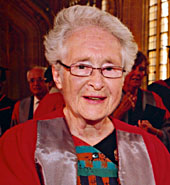 | Mary Douglas |
A literary form that has been used in religious writings throughout the world is the focus of this year's Dwight Terry Lectures.
Renowned cultural anthropologist Mary Douglas will present four lectures on the theme "Writing in Circles: Ring Composition as a Creative Stimulus."
The ring composition has been used in works ranging from books of the Pentateuch, Homer's "Iliad," Russian follklore, Persian mythology, Indonesian religious writings and medieval French histories. The highly structured form, "consists of a set of parallelisms," explains Douglas, "the last lines close the ring by returning to the theme of the beginning. ...
"If ring writing encounters various technical problems, so does reading like a ring," she adds. "Like unfolding a scroll from the two ends, the reader finds the message held in the very middle. The text radiates from the mid-turn in both directions; it has to be read synoptically, like a sonnet."
Douglas' four lectures will be: "How To Recognize a Ring Composition," on Tuesday, Oct. 21; "Structured in Alternating Bands of Light and Dark," on Wednesday, Oct. 22; "Straight Reading Makes Nonsense of Circular Writing," on Tuesday, Oct. 28; and "Speculations on the Idea of a Major Cultural Change," on Thursday, Oct. 30. All the lectures will take place at 4:30 p.m. in Rm. 102 of Linsly-Chittenden Hall, 63 High St. Each will be followed by a question-and-answer period and a reception (questions may also be addressed to Douglas via the Terry Lectures website at www.yale.edu/terrylecture/).
The talks are open to the public free of charge.
Douglas is considered one of the most influential anthropologists of the 20th century. Her work has ranged from African societies to the classifications of biblical law, from sociology to religion, and from food to dirt. One of the major goals of her work has been unraveling the principles by which people order their world. Two of her books, "Purity and Danger" and "Natural Symbols," have become classics in the field of anthropology, and many of her ideas have influenced thought in other social sciences, including history, literature, religious studies and cultural studies. Still an active anthropologist, Douglas is a retired professor of social anthropology at London University, an honorary fellow at University College in London and professor emerita of humanities at Northwestern University.
The Dwight Terry Lectureship was established in 1905 by a gift from Dwight Harrington Terry of Bridgeport, Connecticut. The series focuses on religion and its application to human welfare in the light of scientific knowledge and philosophical insights. The lectures are published in book form by Yale University Press. Previous Terry Lecturers have included John Dewey, Margaret Mead, Erich Fromm, Paul Tillich and Rebecca West.
T H I S
'Writing in Circles' is theme of
this year's Dwight Terry Lectures
 W E E K ' S
W E E K ' S S T O R I E S
S T O R I E S![]()
 Pharmacology department marks opening of new wing
Pharmacology department marks opening of new wing![]()
![]()
 Revolution in biology leads department onto a new path
Revolution in biology leads department onto a new path![]()
![]()
 Yale celebrates 300th anniversary of renowned Russian city
Yale celebrates 300th anniversary of renowned Russian city
![]()
![]()
 Staff reveal their artistic side in city-wide festival
Staff reveal their artistic side in city-wide festival
![]()
![]()
 Evidence of devastating volcano found in tortoises' genes
Evidence of devastating volcano found in tortoises' genes
![]()
![]()
 Team discovers possible drug target for metastatic cancer
Team discovers possible drug target for metastatic cancer
![]()
![]()
 Despite adversity, Chinese researcher brings his love of science to Yale
Despite adversity, Chinese researcher brings his love of science to Yale
![]()
![]()
 Freshman Addresses
Freshman Addresses
![]()
 School of Management is honored for its mission . . .
School of Management is honored for its mission . . .
![]()
![]()
 Half of children studied choose toys over sweets . . .
Half of children studied choose toys over sweets . . .
![]()
![]()
 Series will examine issues of illness and health in the African diaspora
Series will examine issues of illness and health in the African diaspora
![]()
![]()
 Seminars and exhibits honor contributions of Yale ecologist
Seminars and exhibits honor contributions of Yale ecologist
![]()
![]()
 'Writing in Circles' is theme of this year's Dwight Terry Lectures
'Writing in Circles' is theme of this year's Dwight Terry Lectures
![]()
![]()
 Infants' ability to predict actions may emerge as early as 12 months
Infants' ability to predict actions may emerge as early as 12 months
![]()
![]()
 Sessions to explore prospects, potential of biotechnology
Sessions to explore prospects, potential of biotechnology
![]()
![]()
 Russian Singing Angels to perform in benefit concert on campus
Russian Singing Angels to perform in benefit concert on campus
![]()
![]()
 Memorial Service
Memorial Service
![]()
![]()
 Campus Notes
Campus Notes
![]()
Bulletin Home |
| Visiting on Campus
Visiting on Campus |
| Calendar of Events
Calendar of Events |
| In the News
In the News![]()
Bulletin Board |
| Classified Ads
Classified Ads |
| Search Archives
Search Archives |
| Deadlines
Deadlines![]()
Bulletin Staff |
| Public Affairs
Public Affairs |
| News Releases
News Releases |
| E-Mail Us
E-Mail Us |
| Yale Home
Yale Home